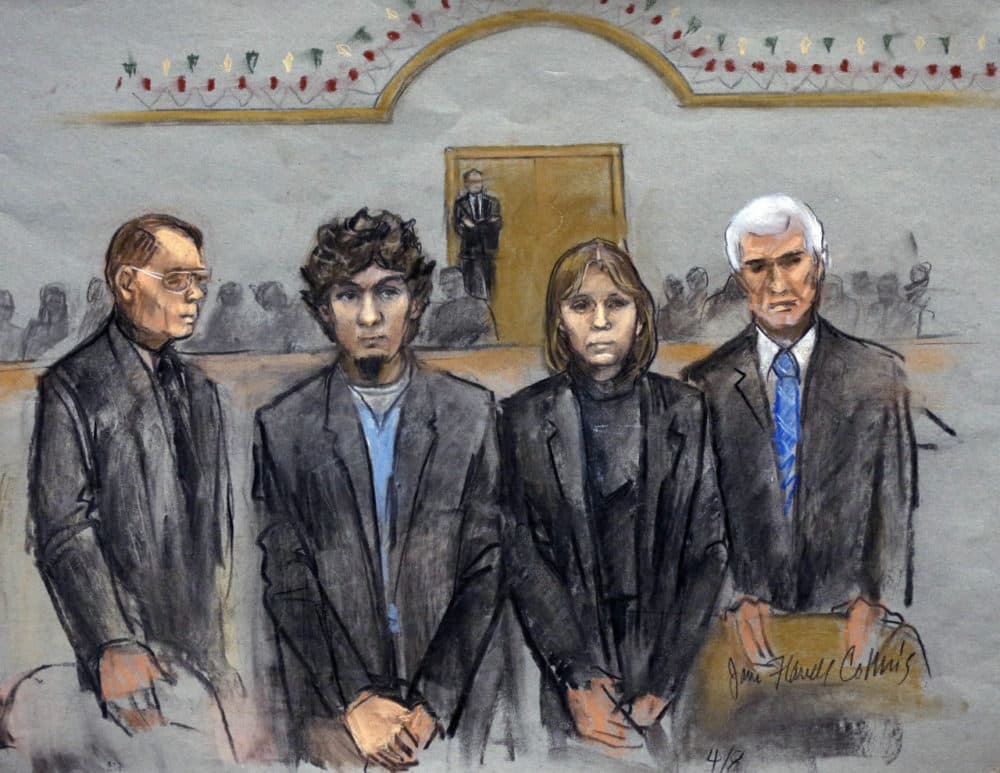Advertisement
Death Penalty For Tsarnaev Increasingly Unpopular, WBUR Poll Finds
Resume
Boston area residents see the death penalty as an increasingly unpopular punishment for convicted Boston Marathon bomber Dzhokhar Tsarnaev, a new WBUR poll suggests.
The survey (topline, crosstabs) of 509 registered voters in Greater Boston found 58 percent support life in prison for Tsarnaev. That number rises to 61 percent among voters in the city of Boston.
"Over the last month, we've seen support for life in prison grow by about 10 points [in the Boston area]," said Steve Koczela, president of the MassINC Polling Group, which conducts surveys for WBUR.
According to the poll, only 31 percent of Boston area residents said they support the death penalty for Tsarnaev. That support drops to 26 percent in the city of Boston.
The earlier WBUR survey was conducted last month, while the first phase of the Tsarnaev trial was ongoing. The latest poll was conducted just days after his conviction.
People's feelings about executing the convicted bomber are on par with how they view the death penalty in general.
"Even though the bombing happened here ... even though it had a deep personal impact on a lot of people ... it doesn't seem to have changed people's views on the death penalty versus life in prison," Koczela said.
Fifty-seven percent in the Boston area and 63 percent in the city of Boston oppose the use of the death penalty broadly.
No one's been executed in Massachusetts, which doesn't have the death penalty, for nearly 68 years. But this bombing trial is a federal case, which is why the death penalty is an option. And in order to serve on the case, jurors had to agree that they could impose that punishment.
Out on the streets, though, that's not an easy judgment call.
"I’m really not ... supportive of the death penalty," said Steve Cavallo after Mass at St. Patrick's church in Watertown, the suburb where Tsarnaev was caught hiding in a boat two years ago. "But it's so horrible, I can’t even describe what [Dzhokhar and his deceased brother Tamerlan] did."
Cavallo said executing Tsarnaev is a really difficult moral dilemma.
"Because I don’t believe in it, but I feel it’s probably warranted in this case," he said tentatively, as if he was walking himself through this decision out loud.
But church leaders say it's not warranted. Last week, the Roman Catholic bishops of Massachusetts put out a statement quoting Pope Francis, who described the death penalty as "an offense against ... the dignity of the human person."
In Islam, there's no similar sweeping prohibition against the death penalty. The ethics of capital punishment are determined on a case-by-case basis.
And in this case, Abdul Cader Asmal has little mercy for Tsarnaev.
"I think a death penalty would be an appropriate punishment for a person who had no remorse during his trial," 76-year-old Asmal said after prayers at Boston's central mosque in Roxbury.
For Asmal, this is personal. He despises the bomber for hurting people and using Islam to justify it.
"We need to send a strong signal to would-be terrorists that this is the punishment they would face if they go around killing innocent people," Asmal said.
But some Bostonians question the message that we might send — not only to others, but to ourselves.
"I'm just fundamentally opposed to killing a human being," said 34-year-old Emily Hodge, who ran the 2013 marathon — the year of the bombing.
For Hodge, the attack hit close to home. On Monday, she'll run her sixth consecutive Boston Marathon.
"I’ve always been opposed to the death penalty since long before the marathon bombing, but I will say that the marathon bombing did make me second guess myself, and that was hard," she said.
Still, she hopes the jury chooses life without parole for Tsarnaev.
"I think the punishment of him is much more about our justice system and our beliefs as a better group of people than maybe he is," she said.
The penalty phase of the trial begins Tuesday, when the same jurors who found Tsarnaev guilty will decide whether he should die or spend the rest of his life in prison.
The jury will need to reach a unanimous decision on the death penalty. If even one juror disagrees, Tsarnaev will be spared from execution.
And if that happens, he would likely be shipped to the supermax prison in Colorado to spend 23 out of 24 hours a day in solitary confinement.
Methodology: The poll surveyed 509 registered Boston area voters between April 10-13. The poll included a base sample of 409 residents in the entire area including Boston, with an additional 100 voters living in the city of Boston. Between the base sample and oversample, a total of 223 voters in the city of Boston were interviewed. The Boston area is defined as communities inside Route 128 or straddling that corridor. The margin of error for the full sample is 4.9 percent and the margin of error for the Boston sample is 6.5 percent.
This segment aired on April 16, 2015.
